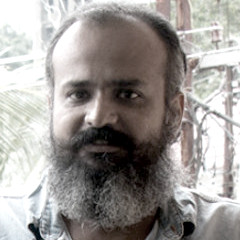KG George's 'Yathrayude Anthyam' is a starting point to embark on a serious cinema journey

Mail This Article
'Yathrayude Anthyam', directed by K G George for Doordarshan in 1989, is a telefilm that has inexplicably stayed with me since I first watched it on the old black and white Keltron television. Long-winding takes dipped in deep shadows and medium close-ups of Murali and M G Soman - the usual villains of that time; the telefilm had nothing that would have tempted a kid to skip his playtime. However, the melancholy lingered, intensifying with each rewatch; initially on television, then at local film society screenings, and now on YouTube.
'Yathrayude Anthyam', scripted jointly by George and John Samuel based on the short story 'Kottayam Manathavadi' by Parappurath, begins with the protagonist The Writer/VKV's (Murali) car journey. For close to two minutes the camera tracks the journey from outside and inside the car giving no glimpses of the traveller. M G Radhakrishnan's composition evokes the joy of travelling in the viewers. However, passenger VKV is anxious and the reason is revealed only when the protagonist begins his soliloquy in the fourth minute. The Writer had to hire a taxi after receiving a telegram from his mentor Abraham (Soman), announcing his desire to meet him. At a time when the common mode of communication was writing letters, telegrams were the harbingers of either good or bad news.
The scene feels like a routine one, till you realise that the music is unhitched from the internal turmoil of the character. It evokes a sense that the journey is independent of the traveller. The novel thought brought a fresh grammar to Malayalam cinema. Or was the director pointing out that no matter how gloomy the destination may be, the journey will always be joyful? One would never know, as the mastercraftsman embarked on his final journey on September 24, 2023.
The screen time allocated to each trip to Mantharathoppu is long and detailed, allowing not just the characters, but the viewers also to become engrossed in it. The KSRTC bus to Mantharathoppu soon assumes the role of a society that is heading to its destination while each of its passengers is engaged in their own journey. The NRI traveller initially complains about the lack of professionalism and consideration exhibited by the bus conductor. However, he approves of and appreciates when the conductor ejects some students who attempted to board the bus during the journey. Although their politics and outlook on life are entirely different, when the NRI man approaches him to initiate a conversation, The Writer finds it pleasant. The NRI man's comparison of how the American and Indian authors are compensated for their work hits The Writer like sharp darts, and his reaction does nothing to conceal the harsh realities. Murali's acting prowess is on full display in this scene.
While The Writer compares how life on both sides of the path has changed over the years with greenery giving way to concrete buildings in a short period, the NRI traveller frets comparing life in the US with that in Kerala. The same path leads these two travellers on two distinct journeys.
These are just a few instances in which George demonstrated that the paths of his travellers intersected at some points while running parallel at other times, either in the same or opposite direction. George also brings in a death to momentarily interrupt the journey, and then it continues, much like life.
Despite distractions, The Writer's thoughts keep returning to Abraham Sir's telegram, and he continues to find reasons to avoid the troubling notion that something unfortunate may have occurred.
George trains the camera on actor Murali's face for extended periods, yet the scene never fails to captivate the viewers. That's the confidence they both had in their craft and in each other.
The Writer's thoughts and memories unhurriedly lead the viewers into a flashback, deepening our understanding of his profound relationship with his mentor and friend. The flashback, unlike in many films, never feels forced. Even the intellectual exchanges between The Writer and his mentor feel natural, and viewers never find them unrealistic. As a storyteller, George effectively prepares his viewers well in advance for these profound philosophical moments through his detailed visualisation of the journey.
The filmmaker maintains this rhythm until the writer's journey culminates beside the mortal remains of his mentor. George maintained this rhythm in all his films, even when they varied in genre. The bold filmmaker had immense confidence in his actors, technicians, and himself. And that's what makes his films stay fresh even after years.


